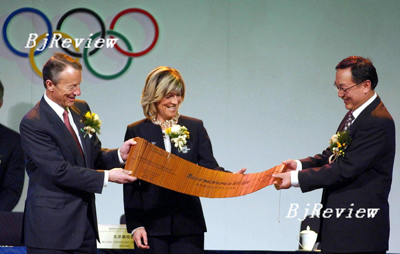
Nineteen eighty-four was a lucky year for China as the country resumed its seat on the International Olympic Committee (IOC) after a 52-year absence. It was also a notable time for Legend Group Ltd., the computer company founded that year by businessman Liu Chuanzhi and 10 other engineers.
Although Legend started its business in a rented house in Beijing with a mere 200,000 yuan, it had grown to become the largest PC maker in the Asia-Pacific Region by 1999. It then changed its name to Lenovo Group Ltd.
Lenovo's ambition didn't stop there. It set its sites on higher goals-global recognition and international product sales. To help accomplish these tasks, the company tried wooing the IOC for possible marketing opportunities during the Olympic Games.
But Lenovo was still too young and too small to get noticed. It sent e-mails to the IOC in 2002, but never received any replies that showed interest, said Li Lan, a former general manager for branding at Lenovo.
Two short years later-and 20 years after its founding-Lenovo hit another streak of luck and became one of the few companies selected for the Olympic Partner Program (TOP), giving it exclusive worldwide rights to the use of Olympic logos, such as the five-colored rings.
Now, Lenovo is rolling out a slew of PCs and other computer hardware on its home turf for the 2008 Summer Olympics in Beijing. Under its contract with the IOC, Lenovo must provide PCs and laptops, servers, printers and digital display boards between 2005-08 for a round of winter and summer games. It already provided hardware during the Winter Games in Torino, Italy, in 2006.
In return for its sponsorship, Lenovo can develop marketing programs with the IOC and the national Olympic committees or organizing committees of more than 200 countries and regions worldwide, host hospitality events at the Olympic Games and receive preferential access to Olympic broadcast advertising.
For next year's Summer Games, Lenovo will choose 150 of its 3,000 technicians and engineers all over China for a team dedicated to developing Olympic technology. This team will provide computer services during the 42 sports competitions that China is hosting between July 2007 and June 2008 during its "Good Luck Beijing" event, a run-up to the Summer Games in 2008. A total of 34 Olympic competition venues and 46 training centers will be operational during this period.
Next August, Lenovo will set up nine Internet cafes at the Olympic Village in Beijing, as well as information and computer maintenance centers around the capital and in other cities, such as Qingdao and Hong Kong, hosts of some of the competitions.
As it did for the Torino Games, Lenovo will work closely with two other TOP sponsors-Atos Origin, S.A., which provides the information technology system, and the Omega unit of The Swatch Group Ltd., which provides the timing.
Make it smooth
"Lenovo provided hardware to Beijing's organizing committee for the Summer Games earlier than it did for the Torino Olympic Winter Games," said Xie Long, who oversees Olympic sponsoring affairs at Lenovo.
The hardware must pass durability and stability assessments to qualify for Olympic usage. The equipment undergoes a three-year testing period in the Olympic integrated test lab and in field tests during various sports matches, Xie said.
Lenovo has made agreements with Beijing's organizing committee on the types and configurations of PCs, laptops, servers and printers it will supply. It recently delivered a third set of equipment to the Beijing organizing committee. To date, its total equipment delivery has added up to 8,238 units.
| 